13 fantastic fruits of Vietnam
Fruit is essential to everyday life in Vietnam. From street corners to bicycle vendors, signs for ‘hoa quả’ atop perfectly stacked pyramids of colourful fruits are everywhere. Snack happy, be adventurous and dive into the wonderful world of Vietnam’s fruits with this guide.
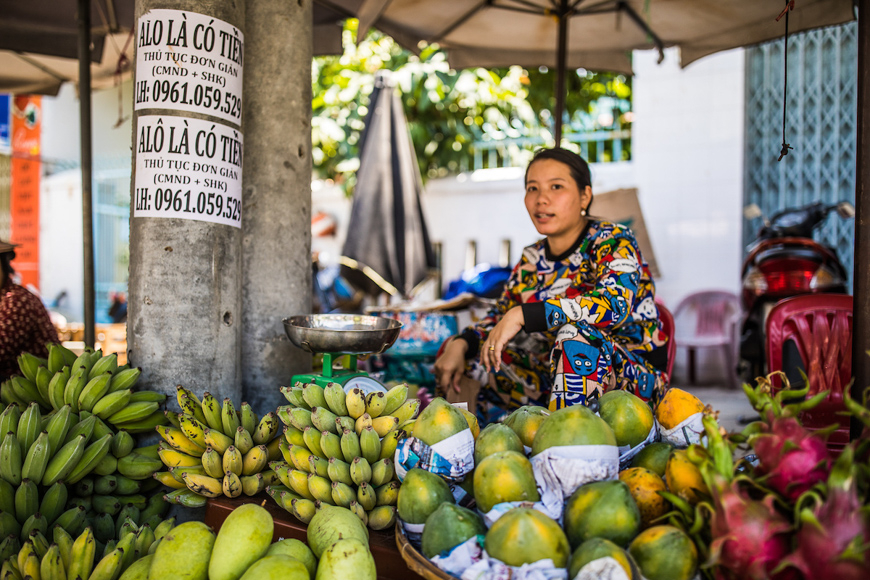
Mangosteen | Măng Cụt
Easily one of the most exotic fruits you will taste in Vietnam, mangosteen is only in season May until August. Even the Vietnamese get excited for mangosten season. With thick purple rind, and soft, tangy flesh, mangosteens are easy to find in supermarkets and street-side vendors all over Vietnam.
How to eat it
Gently squeeze the fruit along the middle to break the skin and lightly twist its shell apart. Pull out a pod of fruit and pop it in your mouth to unleash the flavour! Watch out: larger pods may contain a seed. Tuck into mangosteen on its own or in a savoury southern salad (gỏi măng cụt.)
Star Fruit | Khế
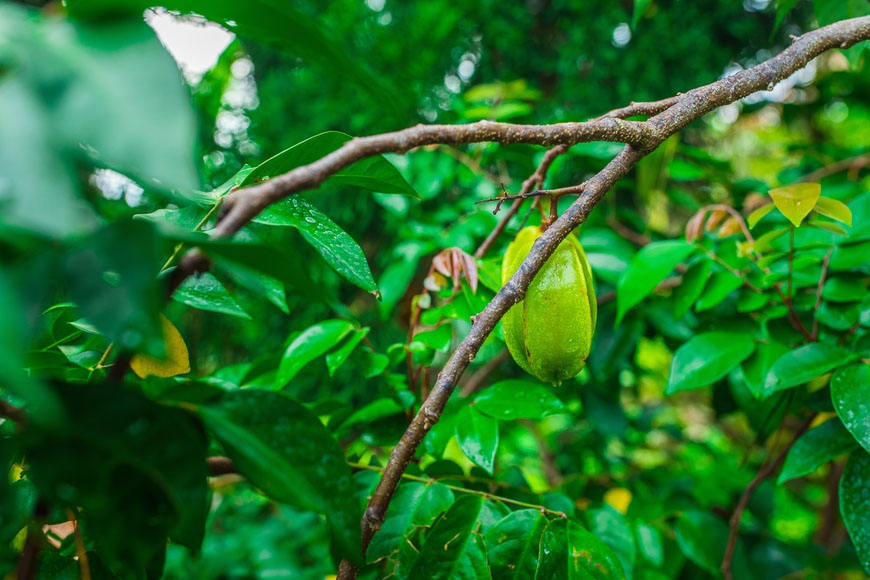
When ripe and golden, star fruit is refreshing, juicy and a definite crowd pleaser. Its season can be unpredictable as the trees bloom twice a year. The good news is, you can usually eat this tangy delicacy year-round, although you’ll have better luck finding it in the Mekong Delta.
How to eat it
Slice your star fruit horizontally to reveal perfect starry snacks. As the skin is thin and waxy, it’s edible and only requires a rinse before slicing. Throughout Vietnam, star fruit is also a staple ingredient in a home-style sweet and sour fish soup called canh chua cá.
Rambutan | Chôm Chôm
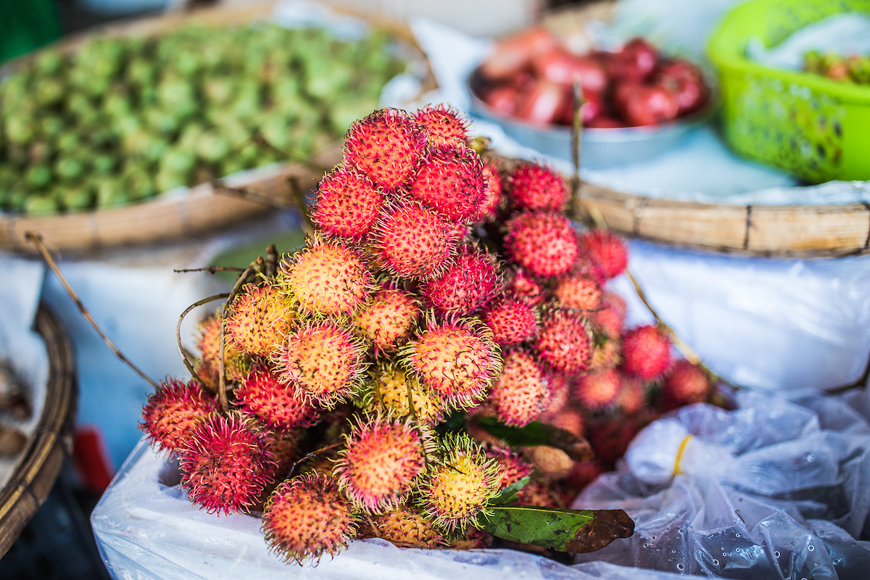
A fun way of saying ‘messy hair’, rambutan are as delicious as they are colourful. Their vibrant and hairy exterior hides white translucent flesh with a mild sweet and sour flavour, similar to a grape. Harvested twice each year, big bunches of these striking fruits are easy to find in the summer and even winter.
How to eat it
Vietnamese people love rambutan as a healthy and refreshing snack. Give the fruit a slight pinch and twist to remove the exterior and reveal the flesh, then enjoy! If you cannot peel it, simply let it ripen a little longer.
Dragon Fruit | Thanh Long
A direct translation for its name, dragon fruit is grown widely in the Mekong Delta. Dragon fruit has a bizarre look, with thick fuschia rind and wispy green extensions outside. Inside, the flesh is white or purple dotted with small seeds.
How to eat it
Dragon fruit is easy to enjoy: just slice it and remove the thick rind. While it has many health benefits, this cacti is actually not very flavourful and has an almost watery taste. Often enjoyed by the Vietnamese at the end of a meal, it’s a great palate cleanser.
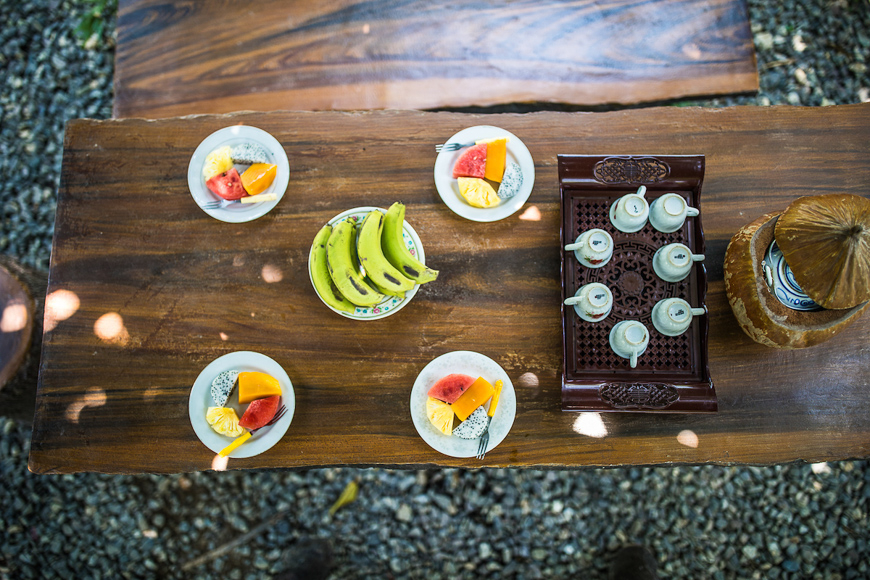
Mangos | Xoài
Ah, mangos! These may be one of the most recognizable fruits on the list, yet they are absolutely worth a try in Vietnam. Aromatic and juicy, the Vietnamese love eating green mangoes as snack dipped in chili salt and shredded in a savoury green mango salad (gỏi xoài).
How to eat it
Slice a ripe mango around its pit with a sharp knife, then break the halves apart gently. Another method is to slice sections off around the pit and do a criss cross cut along the skin. When you bend the peel back, the fruit will almost stand on its own, making it easy to eat off the skin.
Longan | Nhãn Lồng
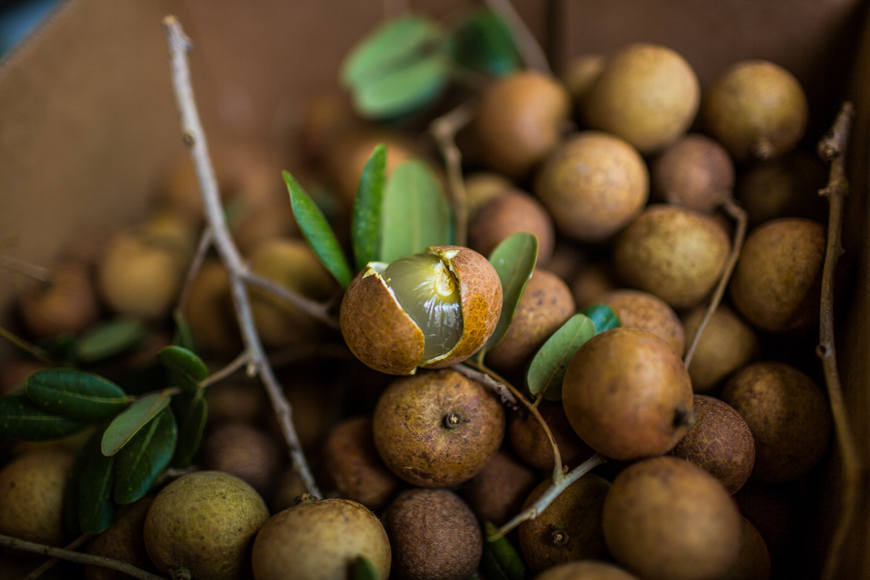
Longan is a favourite snack in Vietnam and is easily spotted in big bushels throughout the ry’s many street markets. Called ‘dragon’s eye’ in Vietnamese, this fruit is often compared to lychee, however it has a slightly sweeter flavour and more flesh.
How to eat it
Peel off the thin and brittle brown skin to reveal the translucent fruit holding a hard and shiny black seed. Vietnamese people often enjoy longan on its own with a cup of tea, or in a cold sweet soup with lotus seeds (chè hạt sen nhãn lồng) the perfect treat on a hot summer day.
Pomelo | Bưởi
Pomelos are like grapefruit’s giant cousin, but with a milder taste. While they might appear intimidating, pomelos are worth the effort. This large, slightly oblong citrus is green and faintly yellow when ripe. You can find it most of the year in Vietnam, and on display during special occasions.
How to eat it
Once you cut the pomelo open, you’ll see the thick white pith obstructing its pale yellow or pink flesh. Where pomelo stands out is once you peel off the bitter tasting pith, the flesh is made up of curious little sacs filled with juice. Pomelo is a popular ingredient in Vietnamese savoury salads, such as gỏi bưởi.
Rose apple | Quả Roi in the north, Quả Mận in the south
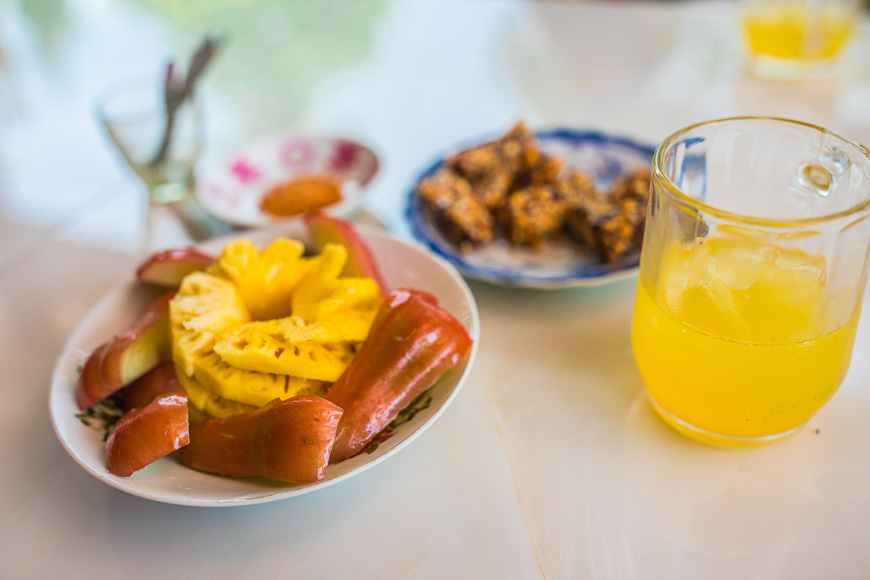
Shaped like a bell, this unusual red fruit has crispy and juicy flesh, with a watery textured much like a melon. Rose apples have tender flesh, and the flavour can be described like unripe pears with a splash of rosewater. You'll find this refreshing fruit growing most of the year in the south of Vietnam.
How to eat it
Despite its English name, the only similarities this fruit has to an apple is how it’s eaten. You can munch around the core (just avoid the base) or slice it into quarters and dig in.
Star Apple | Vú sữa
The Vietnamese name for star apple translates to mothers’ milk, and is connected to an old folktale. This spherical fruit is roughly the size of an orange, with tight, shiny skin in shades of violet or green. The skin and rind are bitter, but the fruit inside is white with a mellow taste.
How to eat it
Grown in orchards in the Mekong Delta and Central Vietnam, there are two ways to try star apples like a local. You can cut it in half and scoop out the fruit with a spoon (be careful for seeds that are large and inedible), or you can press and roll it to release the juice inside, then puncture a hole in the bottom to suck out the milky juice.
Guava | Ổi
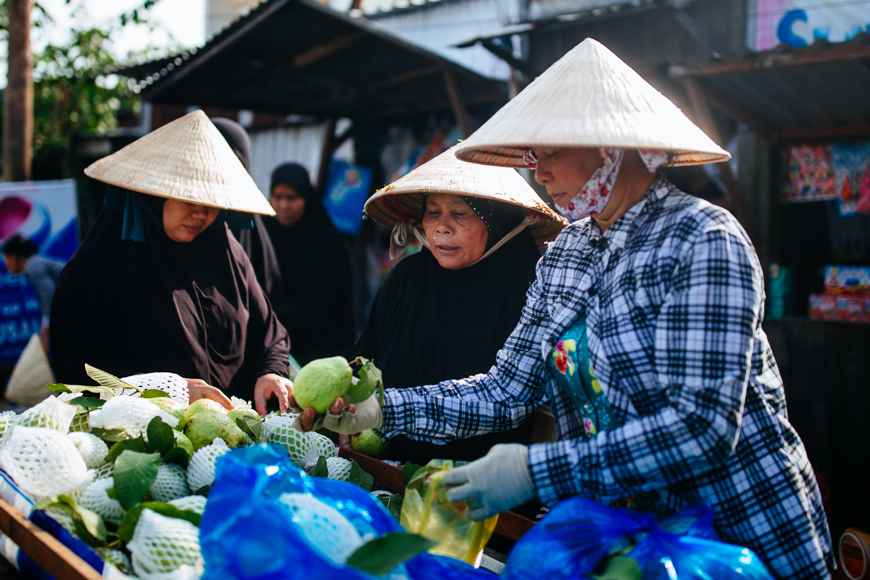
Roughly the size of a softball, this pear-shaped fruit has a bumpy exterior and light green colour. Brought into Asia Central America, guavas in Vietnam are green with white or pink flesh, and have a light, herbal flavour.
How to eat it
Vietnamese people love guava, and will eat it ripe or unripe, cut into chunks and dipped in chili salt. The guava’s mild and slightly acidic taste pairs well with the sharp and spicy seasoning.
Passionfruit | Chanh Leo
Purple and roughly the size of a tennis ball, passionfruit is a much-loved ingredient in Vietnamese kitchens. The seeds are edible and the flavour is refreshing with a sharp finish. You can easily find passionfruit at streetside cafes in every season. Try it as a juice (nước chanh leo) or with yogurt, shaved ice and a hint of sugar (sữa chua chanh leo.)
How to eat it
The thick rind can be gently pulled apart in your hands. Inside the passionfruit you’ll find soft yellow and orange seeds, which can be scooped out with a spoon and used to make tart and refreshing drinks.
Durian | Sầu Riêng
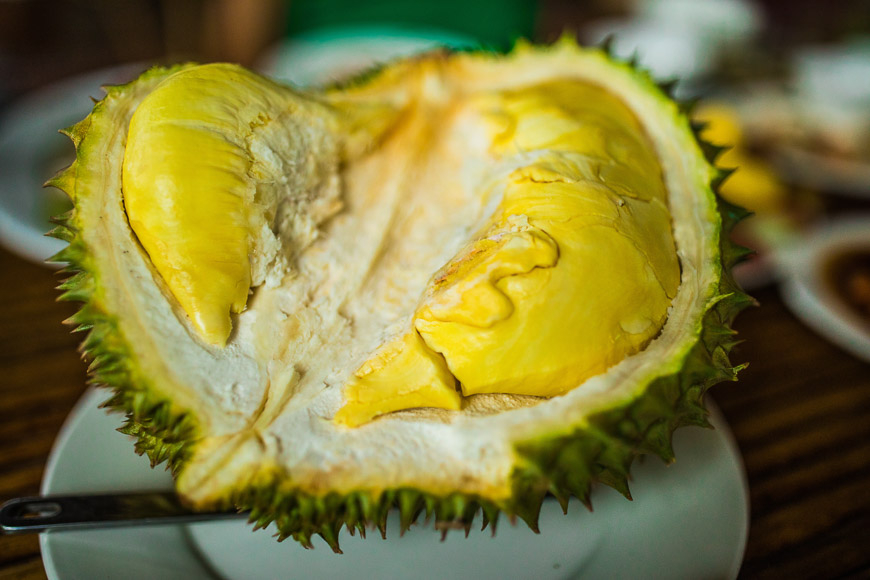
Durian is known worldwide for its pungent aroma, which is so powerful the fruit is banned public transport in many ries. The 'king of fruits' looks and tastes like nothing else in the world. The texture of durian is often compared with custard, and the buttery flesh melts on the tongue, leaving behind a strong flavour and fragrance which durian addicts can't get enough of.
How to eat it
Durian is tough, between the spikes and the smell, so don’t worry about asking your vendor to carve off a slice for you. Some good ways to try durian are in chè Thái, xôi sầu riêng (sticky rice with durian custard) or bánh pía, a puff pastry with a creamy durian filling.
Jackfruit | Mít
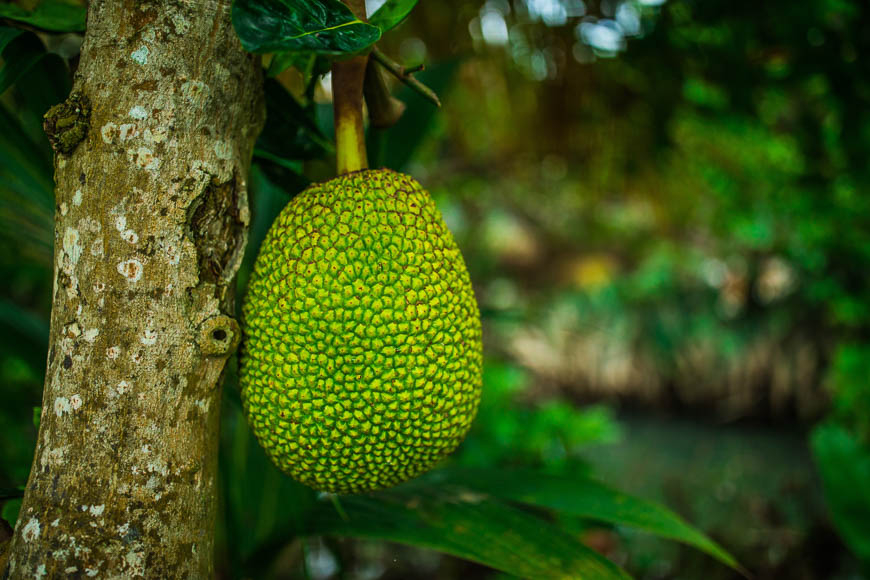
Easily confused with durian, jackfruits are similar in size and colour on the outside, but different once they're open. Jackfruits can grow to be the largest and heaviest fruits in the world. The skin is covered in ridged bumps, and the flesh has a gummy texture. Jackfruit has many fans among fruit lovers, who enjoy pulling apart the stringy meat by hand and savouring its sweet, delicate taste.
How to eat it
Jackfruit is the most difficult fruit to open on this list, even more formidable and messy than durian. You'll want help to get your jackfruit open before you dig in. You can also seek out a taste of jackfruit in hoa quả dầm, a bowl of crushed ice, coconut cream and mixed fruits.
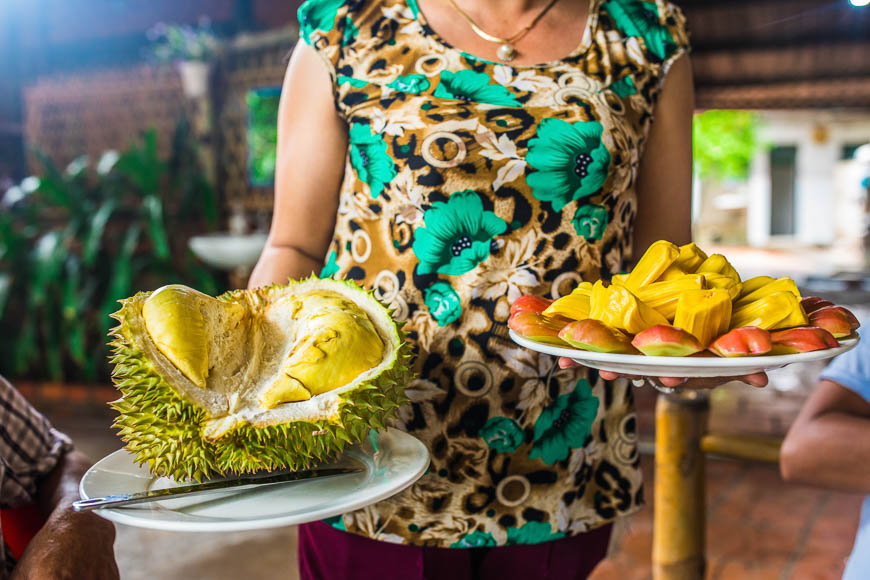
Posts same category










 Share:
Share:









